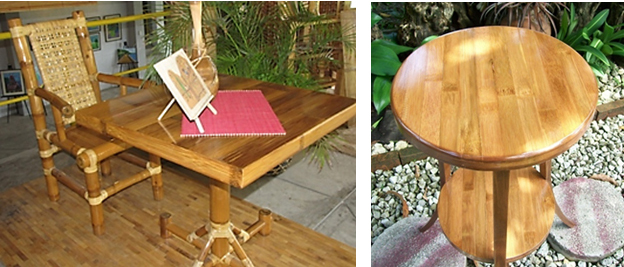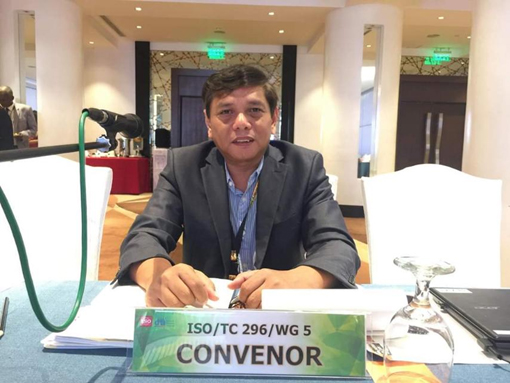
Unique, strong, and versatile – these are some of the characteristics being attributed to laminated bamboo strips making it a strategic resource for designing attractive furniture and a valuable product prized by ingenious craftsmen in the country.
To address the need for a standard on laminated bamboo strips, the Philippines, through the Department of Trade and Industry’s Bureau of Philippine Standards (DTI-BPS), submitted a New Work Item Proposal (NWIP) on laminated products made of bamboo strips for indoor furniture purposes to the International Organization for Standardization Technical Committee on Bamboo and Rattan (ISO/TC 296). The development of such standard will promote and facilitate international trade of laminated bamboo and reinforce its value, effectiveness, and competitiveness in the market; serve as reference for the formulation of a national standard for laminated bamboo products; and provide guidance to consumers and other stakeholders with regards to its consumption. The proposal of the Philippines was approved by ISO/TC 296 last February 2021.
Laminated bamboo strips, generally referred to as engineered bamboo in the Philippines, are bamboo products that are manufactured by fixing together strips/”slats” from bamboo culms to form a composite material designed to serve a specific purpose. These products have various purposes often similar to that of solid wood or laminated wood products which significantly increase their potential demand in the market most especially by furniture-manufacturing and construction firms, designers, manufacturers, and traders of laminated bamboo products.
The development of ISO standard on laminated products made of bamboo strips for indoor furniture purposes is handled by ISO/TC 296/WG 5 - Bamboo for Furniture. The working group is headed by Dr. Rico Jariel Cabangon, Deputy Director of the Department of Science and Technology – Forest Products Research and Development Institute (DOST-FPRDI), as its Convenor. Dr. Cabangon is also the Chairman of the BPS Technical Committee on Bamboo and Rattan (BPS/TC 76) that mirrors the work of ISO/TC 296 and establishes a national consensus position on the documents of ISO/TC 296. In addition, BPS/TC 76 reviews all the draft documents and comments of the ISO/TC 296 working groups which are submitted to the secretariat/convenors.
ISO/TC 296/WG 5 is composed of experts from the Philippines, China, France, Indonesia, Malaysia, Ethiopia, Ghana, Colombia, Netherlands, and Nigeria.
The ISO Working Draft on laminated products made of bamboo strips for indoor furniture purposes (ISO/WD 6128) specifies the requirements and test methods for laminated products made of bamboo strips for indoor furniture purposes including bamboo - wood composite. It does not cover other laminated bamboo products not made of bamboo strips. It also specifies handling, storage, packaging, and marking requirements.
ISO/TC 296/WG 5 had its first meeting last 28 April 2021 in which the working group discussed the results of voting and comments on the proposal of the Philippines. It conducts a monthly meeting to deliberate the contents of ISO/WD 6128 and prepare the Committee Draft for submission to ISO/TC 296. The working group is set to have its next meeting on 30 August 2021 to continue with the deliberation.
Working group meeting held via Zoom Video Teleconferencing last 28 April 2021
BPS Director Neil Catajay congratulated the working group and expressed his hopes to have the standard completely developed in two years. “The Philippines endeavor to complete the development of all relevant standards by ISO/TC 296 as these will significantly contribute to the advancement of the country’s bamboo and furniture making industry. We look forward to the support of other countries to the promotion and improvement of the bamboo industry in the international community,” Director Catajay shared.
“It is with great pleasure to serve as the Convenor of the ISO/TC 296/WG 5 to craft standards on the use of bamboo for furniture purposes. The exchange of information and practices with technical experts among countries provides additional knowledge to the members while providing inputs in the development of international standards to ensure the safety, quality, and reliability of furniture products from bamboo. This standardization activity is important to the Philippines as we are one of the best furniture designers in the world. I thank the DTI-BPS for all the support as the Philippines leads this international standardization activity,” said Dr. Cabangon.
The DTI-BPS is a Participating Member (P-member) to the ISO Technical Committee on Bamboo and Rattan (ISO/TC 296) since 2015. ISO/TC 296 covers the standardization of bamboo, rattan, and its derived materials, including terminology, classification, specifications, quality requirements, and test methods.
The DTI-BPS is the National Standards Body authorized to promulgate Philippine National Standards (PNS). PNS are voluntary in nature and may be used as reference by any interested parties. The conformance to PNS or parts thereof become mandatory only when the same is used as reference in Technical Regulations issued by regulatory authorities.
For more information on standards and standardization activities of BPS, please visit the DTI-BPS Standards and Conformance Portal at www.bps.dti.gov.ph and follow our official Facebook Page (facebook.com/PHstandards/). You may also call the DTI-BPS at (02) 7751.4700 or send an email to This email address is being protected from spambots. You need JavaScript enabled to view it..
(end)
